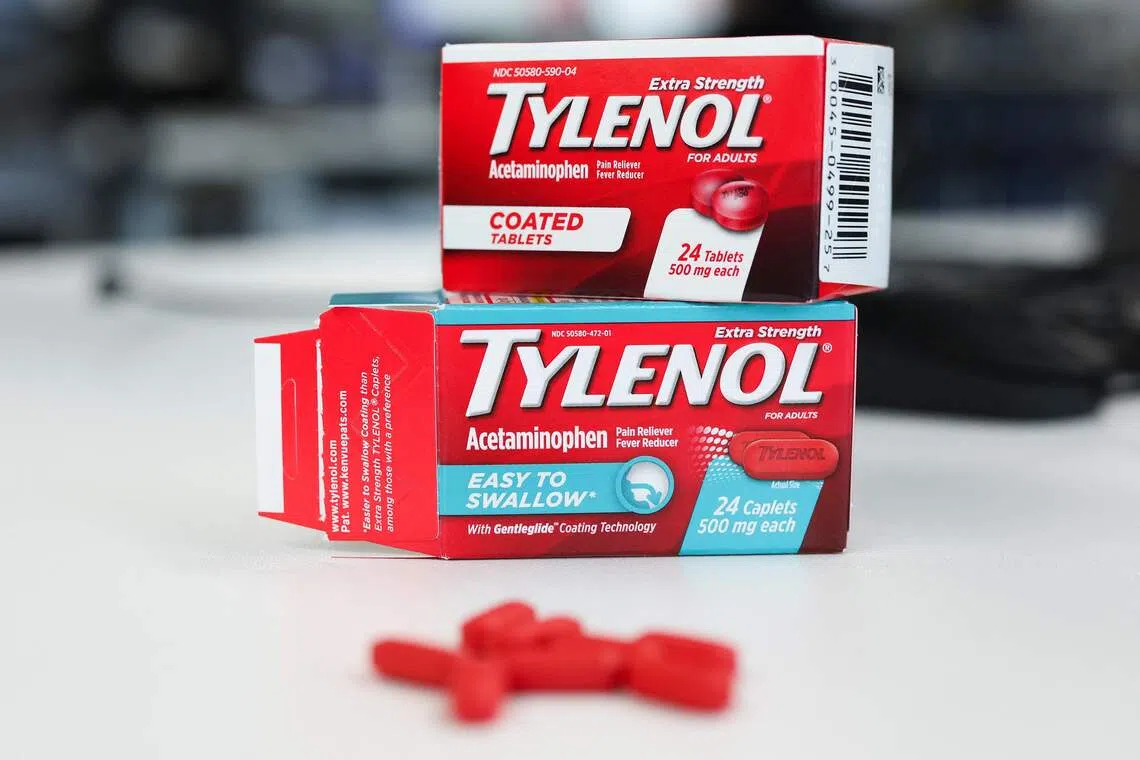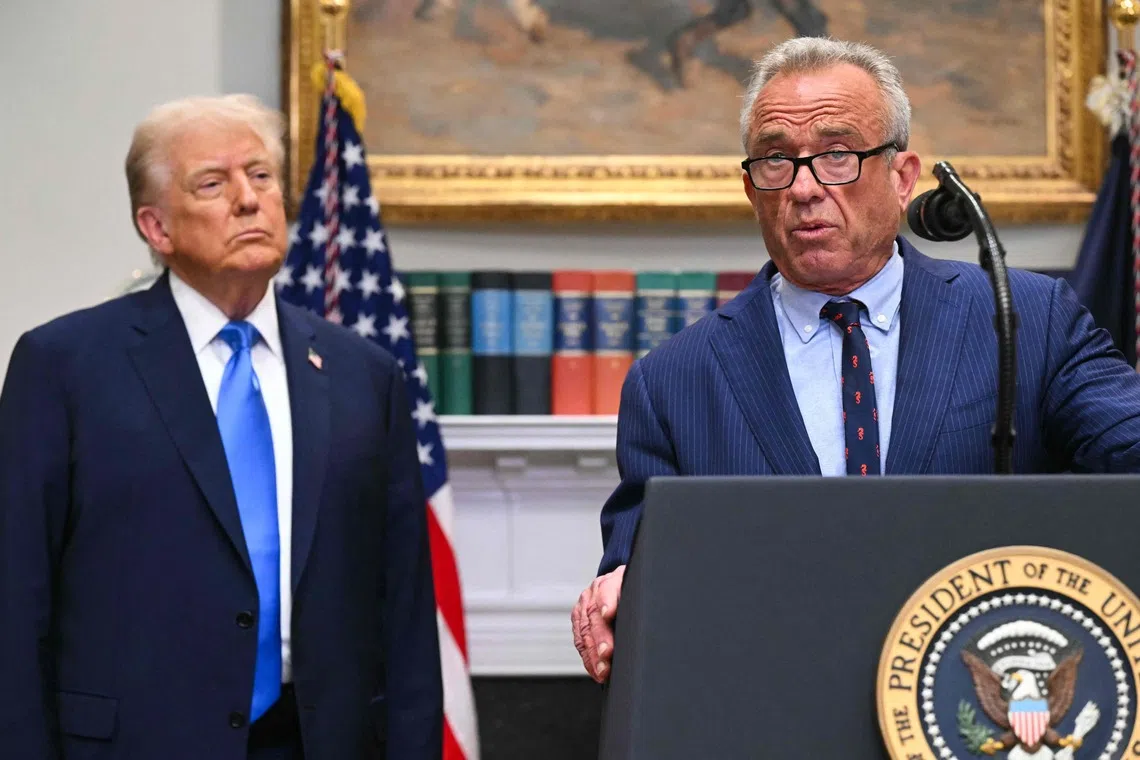Trump links autism with paracetamol and vaccines, claims not backed by science
Sign up now: Get ST's newsletters delivered to your inbox

The US FDA says it will seek a label change for over-the-counter Tylenol and its generic versions to reflect evidence suggesting that use during pregnancy may be associated with an increased risk of neurological conditions.
PHOTO: AFP
Follow topic:
WASHINGTON – US President Donald Trump on Sept 22 linked autism to childhood vaccines and also to the use of popular pain medication Tylenol for pregnant women and children, claims which are not backed by decades of science.
In an extraordinary news conference at the White House, the Republican President delivered medical advice to pregnant women and parents of young children, repeatedly telling them not to use or administer the over-the-counter painkiller, which in Singapore is better known as Panadol or paracetomol.
The advice from Mr Trump, who has no medical training and also pointed out “I’m not a doctor”, goes against that of medical societies, which cite data from numerous studies showing acetaminophen, Tylenol’s active ingredient, plays a safe role in the well-being of pregnant women.
“I want to say it like it is – don’t take Tylenol. Don’t take it,” Mr Trump said. “Other things that we recommend, or certainly I do anyway... don’t let them pump your baby up with the largest pile of stuff you’ve ever seen in your life,” he said, referring to vaccines.
Trump administration backs leucovorin as treatment
Mr Trump’s team suggested leucovorin, a form of folic acid, as a treatment for autism symptoms.
Dozens of medical, research and autism advocacy groups, including the American Academy of Paediatrics and the American College of Obstetricians and Gynaecologists, decried the President’s announcement.
“The data cited do not support the claim that Tylenol causes autism and leucovorin is a cure, and only stoke fear and falsely suggest hope when there is no simple answer,” the Coalition of Autism Scientists said in a statement.
Standing next to Health and Human Services Secretary Robert F. Kennedy Jr, a vaccine critic who has argued that no vaccine is safe, Mr Trump called for a re-examination of a link between vaccines and autism – a theory that has been repeatedly debunked.
“We believe independent, sound science clearly shows that taking acetaminophen does not cause autism. We strongly disagree with any suggestion otherwise and are deeply concerned with the health risk this poses for expecting mothers and parents,” Kenvue Inc, the maker of Tylenol, said in a statement.
Kenvue shares recover in late day trading
Shares of Kenvue recovered 5 per cent in extended trading after slumping more than 7 per cent in Sept 22’s trading session.
The stock has remained down about 14 per cent since Sept 5, when The Wall Street Journal reported that Mr Kennedy planned to link acetaminophen to autism.
Kenvue was spun off from Johnson & Johnson in 2023.
Mr Trump said he is a big believer in vaccines, having led in his first term the pandemic initiative to speed up Covid-19 vaccine development.
Still, he called for the removal of mercury from vaccines and said children should not get the hepatitis B vaccine before the age of 12. It is normally given in the first 24 hours after birth.
He also said the measles-mumps-rubella combination vaccine should be split into three separate vaccines.
The Tylenol-autism link announcement was reminiscent of Mr Trump’s regular press briefings in the early months of the pandemic when he would frequently dispense advice that was not founded on science, including his suggestion that people drink bleach, which his supporters later said was not serious.
Studies have shown vaccines are safe and have saved millions of lives, eradicating childhood diseases such as polio and measles in the US.

US Secretary of Health and Human Services Robert F. Kennedy Jr speaking during an event about autism at the White House on Sept 22 as President Donald Trump looks on.
PHOTO: AFP
Over the last 50 years, it is estimated that essential vaccines have saved at least 154 million lives, Unicef USA president and chief executive Michael Nyenhuis has said.
Only one in four Americans believes that recent recommendations for fewer vaccines from the Trump administration are based on scientific evidence and facts, a Reuters/Ipsos poll showed in September.
“I cannot say that I’ve ever experienced anything like this in vaccines,” said Dr Norman Baylor, former director of the US Food and Drug Administration’s (FDA) Office of Vaccines Research and Review.
Trump administration announces steps it will take
The Trump administration has asked drug companies to be prepared to ramp up production of leucovorin as a treatment for some autism patients, FDA chief Marty Makary told reporters.
The FDA approved a version of the drug made by GSK, aimed at treating a condition associated with autism, but which the drugmaker no longer manufactures.
Once it is established for the use, the administration said Medicaid insurance for low-income people will cover the drug for autism symptoms.
The FDA, in its approval process, cited a review of the use of leucovorin in 40 patients with a rare metabolic disorder called cerebral folate deficiency that can lead to a range of neurological symptoms, some of which are seen in people with autism.
The FDA said it will seek a label change for over-the-counter Tylenol and its generic versions to reflect evidence suggesting that use during pregnancy may be associated with an increased risk of neurological conditions such as autism and attention deficit hyperactivity disorder in children.
The FDA also sent a letter to doctors with a similar warning, but said a causal relationship has not been established.
Researchers say there is no causal link
Researchers say there is no firm evidence of a link between the use of Tylenol and autism. A 2024 study of nearly 2.5 million children in Sweden found no causal link between in utero exposure to acetaminophen and neurodevelopmental disorders.
A 2025 review of 46 earlier studies did suggest a link between prenatal acetaminophen exposure and increased risks of these conditions, but the researchers from the Icahn School of Medicine at Mount Sinai, Harvard University and others said the study does not prove the drug caused the outcomes.
They advised that pregnant women should continue to use acetaminophen as needed, at the lowest possible dose and for the shortest possible period.
Trump officials cited that review and used similar language in advising how much Tylenol to take.
“It is clear that the Tylenol-autism link is not a new question – it has been looked at many times and in many different studies,” autism researcher Diana Schendel of the A.J. Drexel Autism Institute said in a statement, noting that she would like to see what new evidence the administration comes up with.
“Without showing any evidence to back them up, the announcements become reckless and potentially harmful.”
Researchers say leucovorin, used to treat some cancer patients on chemotherapy, has shown some promise in very small trials, but that large, randomised trials are still needed.
“There’s not good evidence that it works. There are some studies, but they’re small and they’re not the best studies. And so it’s certainly not something I’m actively recommending,” said Dr Audrey Brumback, an autism expert and researcher at the University of Texas at Austin. REUTERS

